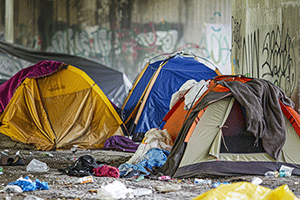 Yesterday, Governor Gavin Newsom ordered state agencies to act urgently to humanely remove homeless encampments from public spaces, prioritizing the most dangerous camps.
Yesterday, Governor Gavin Newsom ordered state agencies to act urgently to humanely remove homeless encampments from public spaces, prioritizing the most dangerous camps.
His executive order pointed out that a June ruling by the U.S. Supreme Court (City of Grants Pass, Oregon v. Johnson et al.) removed one impediment to local governments using the substantial resources provided by state, federal and local programs.
Earlier this year, the California Chamber of Commerce joined the U.S., Arizona and Montana chambers, and Oregon Business and Industry in a Grants Pass friend-of-the-court brief asking the U.S. Supreme Court to reverse a Ninth Circuit Court of Appeals decision that prevented local leaders from addressing the needs of the unhoused and hurt businesses and their communities. Governor Newsom also filed a brief asking the U.S. Supreme Court to hear the case
“It’s time to move with urgency at the local level to clean up these sites to focus on public health and focus on public safety. There are no longer any excuses,” the Governor said in a video statement accompanying yesterday’s executive order.
His executive order directs state agencies and departments to adopt policies and plans consistent with the California Department of Transportation (Caltrans) existing encampment policy.
Since July 2021, according to the Governor’s news release, California has resolved more than 11,000 encampments, and has removed 248,275 cubic yards of debris from encampments along the state right of way in preparation for Clean California projects.
Prioritizing encampments that pose a threat to the life, health, and safety of the community, Caltrans provides advance notice of clearance and works with local service providers to support those experiencing homelessness at the encampment, and stores personal property collected at the site for at least 60 days.
The order encourages local governments to follow the state’s successful model to handle encampments.
Proposition 1 Grant Funding
The Governor also encouraged local governments to apply for $3.3 billion in newly available competitive grant funding from Proposition 1. Applications are available through the Department of Health Care Services.
Proposition 1 includes two parts: a $6.4 billion Behavioral Health Bond for treatment settings and housing with services, and historic reform of the Behavioral Health Services Act (BHSA) to focus on people with the most serious illnesses, substance disorders, and housing needs.
Housing Supports Primer
The state also recently released the Proposition 1 Behavioral Health Services Act: Housing Supports Primer (July 2024) for counties, which explains how to spend the projected $950 million annual BHSA revenue on housing interventions.
The California Chamber of Commerce supported Proposition 1 on the March 5 primary ballot and CalChamber President and CEO Jennifer Barrera co-signed the rebuttal to the ballot argument against Proposition 1.
Proposition 1 provides an effective and ambitious plan that addresses the three interrelated social crises of homelessness, untreated serious mental illness and drug abuse in California.
The June 28 U.S. Supreme Court ruling in City of Grants Pass, Oregon v. Johnson et al. grants cities the authority to enforce laws restricting homeless encampments on sidewalks and other public property.

